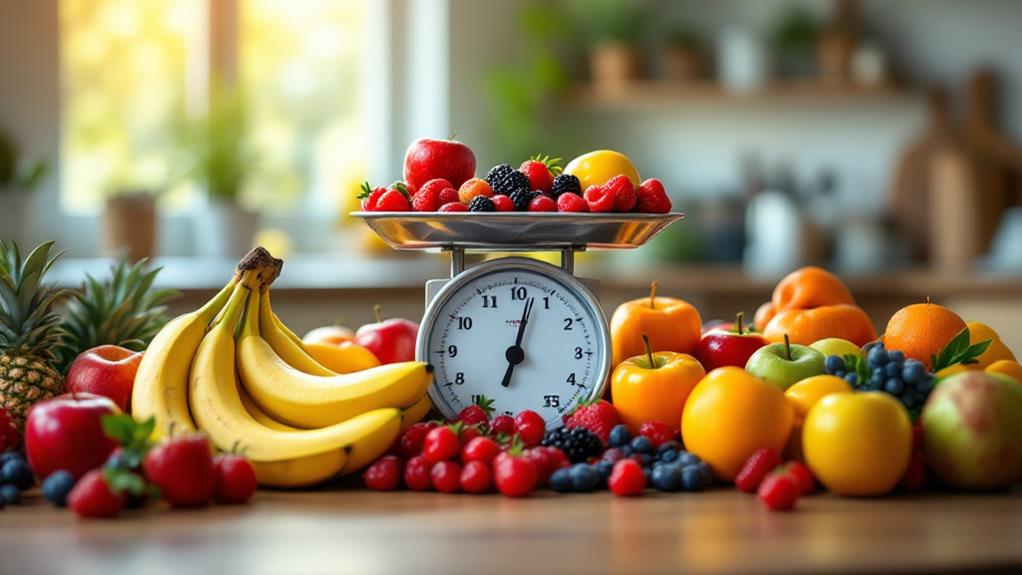The Health Benefits of Plantains: A Versatile and Nutritious Fruit
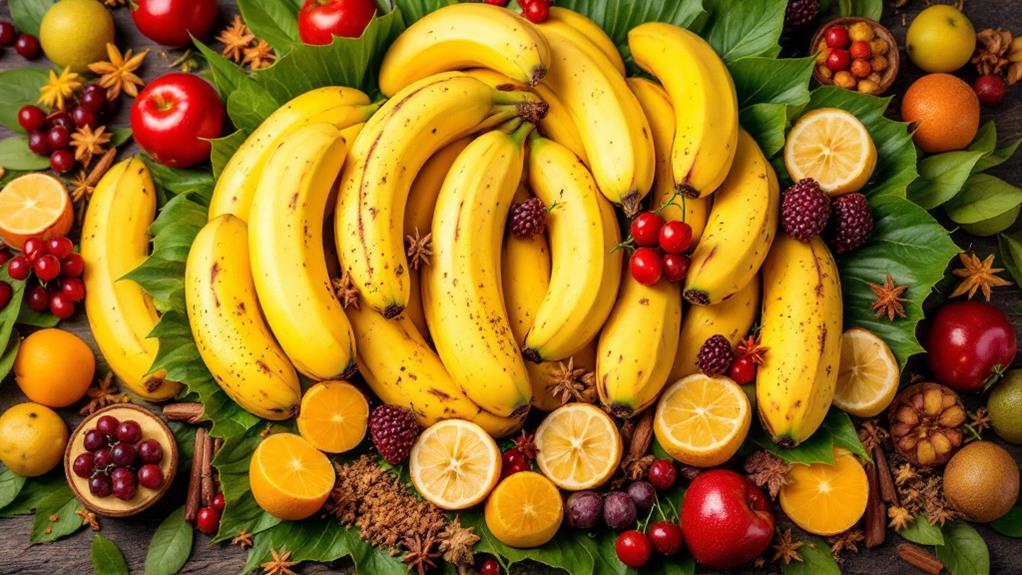
Plantains are a nutritious staple that pack a punch with their unique blend of complex carbohydrates, vitamins, and minerals. You'll find they offer 663mg of potassium and a healthy dose of vitamins A and C per cup, supporting heart health and enhancing the immune system. The rich dietary fiber aids digestion, regulating bowel movements and promoting satiety, which can help with weight management. Unlike bananas, plantains are versatile in the kitchen, perfect for both savory and sweet dishes. Incorporating them into your diet could lead to numerous health benefits, and there's more to uncover about their impact and use.
Understanding Plantains
Plantains, a staple in many tropical regions, are often misunderstood due to their resemblance to bananas. However, their unique characteristics make them a key part of diets in places like Africa and Latin America. Unlike sweet bananas, plantains are starchier and less sweet, making them ideal for a variety of cooking methods. You can boil, fry, or bake them, transforming them into delicious and versatile dishes.
The stages of ripeness—from green to black—determine how you might cook them. Green plantains are firm and starchy, perfect for savory dishes. As they ripen, turning yellow and then black, they become softer and sweeter, suitable for different culinary uses. Ripe plantains offer a delightful mix of flavors and textures, adding complexity to your meals.
Nutritionally, plantains are powerhouses. They're rich in complex carbohydrates and dietary fiber, which are significant for energy and digestion. They also pack fundamental vitamins such as A, C, and B6, along with potassium, contributing to numerous health benefits. By understanding plantains and their benefits, you can appreciate why they hold such an crucial place as a staple food in tropical regions.
Nutritional Breakdown
How do plantains stack up nutritionally? When you look at their nutritional breakdown, plantains are indeed impressive. One cup (139g) of plantains provides approximately 215 calories, mainly from complex carbohydrates. This makes them an excellent energy source, with 58g of carbohydrates per serving. They're also low in fat, containing just 0.22g per serving, and offer a modest 2g of protein.
When it comes to vitamins and minerals, plantains don't disappoint. They're packed with crucial nutrients that enhance your health. Each serving contains a significant 663mg of potassium, which supports heart and muscle function. Furthermore, you'll find 23mg of vitamin C, necessary for immune health and skin vitality. Plantains also offer 63ug of vitamin A to support good vision.
Moreover, plantains are rich in vitamin B6 and folate, fundamental for brain health and reducing the risk of anemia. Fiber content is another highlight, with 3g per serving, promoting digestive health by encouraging bowel regularity. With such a robust nutritional profile, plantains are a versatile fruit that can easily fit into a balanced diet, contributing to comprehensive well-being.
Digestive Health Benefits
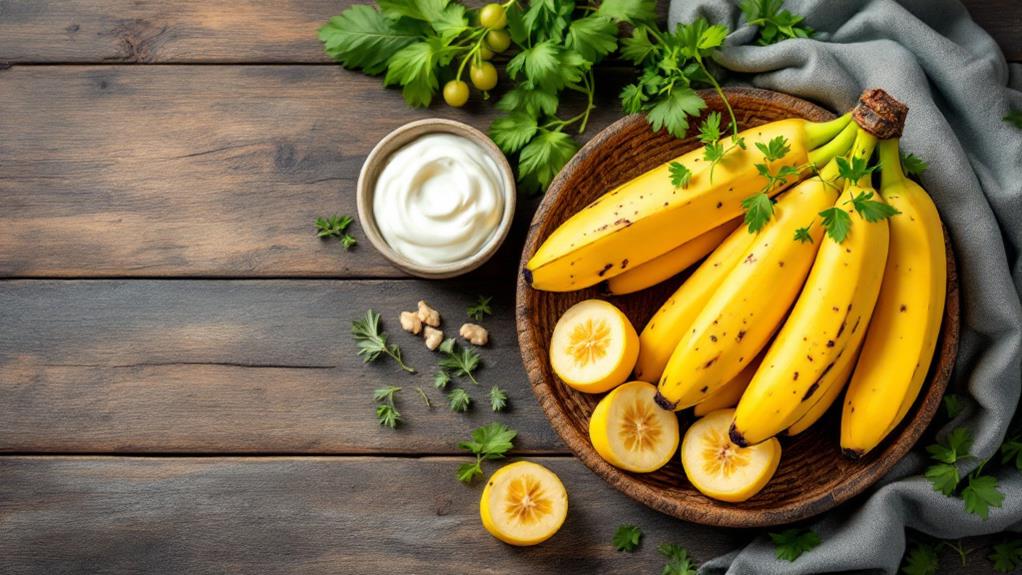
Digestive harmony can be achieved by incorporating plantains into your diet. These fruits, rich in dietary fiber, offer about 3g per serving, which promotes regular bowel movements and helps relieve constipation. The fiber doesn't just stop there; it plays a vital role in regulating your appetite, keeping you feeling full longer and aiding in weight management.
- Unripe plantains' resistant starch acts as a prebiotic, fostering the growth of beneficial gut bacteria and enhancing your comprehensive gut health.
- The low glycemic index (GI) of plantains, typically in the 40s, guarantees a slower digestion process and helps prevent blood sugar spikes, making them a suitable choice for maintaining stable energy levels throughout the day.
- Regular consumption may reduce the risk of digestive disorders, such as hemorrhoids and diverticular disease, due to their high fiber content.
Heart Health Support
While nurturing your digestive system, you can also support your heart health with plantains. These versatile fruits are rich in potassium, providing around 663 mg per cup, which plays an essential role in regulating your heart rate and blood pressure. Maintaining healthy blood pressure is fundamental for general heart health and reducing the risk of cardiovascular diseases.
Plantains are packed with fiber, which helps lower cholesterol levels. By reducing cholesterol, you're directly benefiting your heart and diminishing the chances of heart-related issues. The antioxidants in plantains, especially vitamin C, combat oxidative stress and inflammation, both contributors to heart disease risk. Regularly including plantains in your diet adds a protective layer against cardiovascular problems.
Additionally, plantains have a low glycemic index, typically in the 40s. This means they help keep your blood sugar levels stable, preventing insulin spikes that can strain the heart. Keeping your blood sugar in check is another way plantains contribute to heart health. While they aid in weight management, their complex carbohydrates and fiber promote satiety and stable energy levels, further supporting your heart by preventing overeating. Welcome plantains as a heart-friendly food choice.
Role in Weight Management
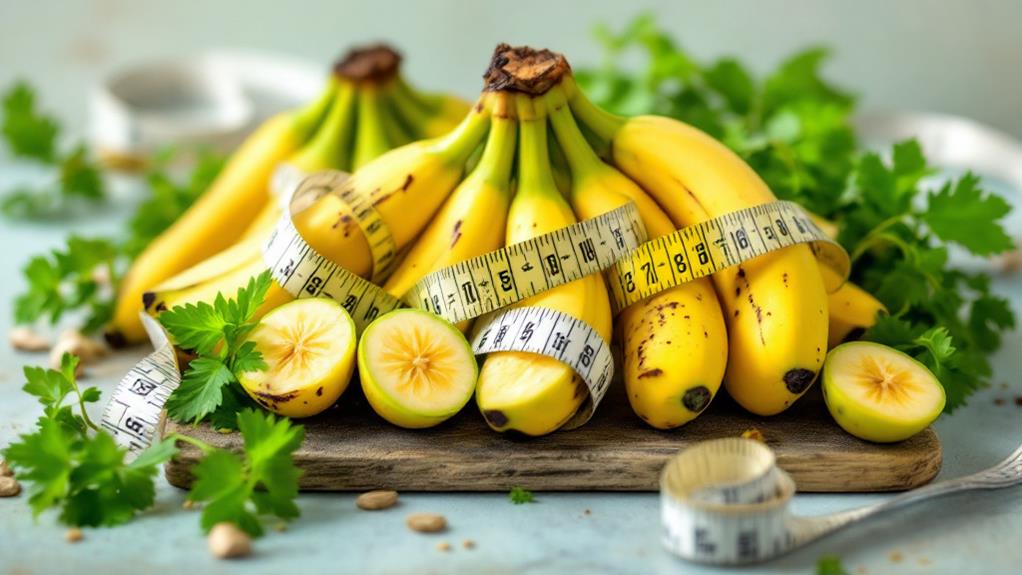
Plantains play a significant role in weight management thanks to their rich dietary fiber content. With 3g of fiber per serving, plantains help you feel full, making appetite control a breeze. Their complex carbohydrates provide steady energy, avoiding those dreaded blood sugar spikes that can derail weight management efforts. Plus, with about 215 calories per cup, plantains fit nicely into a balanced diet, maintaining energy levels without excessive calorie intake.
Imagine incorporating plantains into your meals:
- A wholesome breakfast: Start your day with plantain pancakes that keep you satisfied and energized.
- A hearty lunch: Enjoy a plantain salad that keeps your blood sugar stable and prevents afternoon cravings.
- A fulfilling dinner: Pair plantains with lean protein to curb overeating at night.
The low glycemic index of plantains, generally in the 40s, supports healthy blood sugar levels, essential for reducing cravings and promoting weight management. By including plantains in your balanced diet, you harness their satiating properties to prevent overeating. This ultimately supports your long-term weight management goals, making plantains a smart and delicious choice for anyone looking to maintain a healthy weight.
Culinary Uses
There's an abundance of ways to enjoy plantains in your culinary repertoire. These adaptable fruits can be transformed through boiling, frying, or baking, offering a range of textures and flavors. In many cuisines, you can find unripe plantains making appearances in savory dishes like tostones—crispy fried slices—or mofongo, a flavorful combination of mashed plantains, garlic, and pork cracklings. Their ability to adapt to different cooking methods makes them an exciting addition to any meal.
When plantains ripen, their sweetness shines, making them perfect for desserts. You might try your hand at plantain fritters or pancakes, where their natural sugars amplify the dish's flavor. In baked goods, ripe plantains can sweeten the mix without supplementary sugar. Their culinary uses don't end there; plantains can also be dried and ground into flour. This gluten-free alternative is popular in Caribbean and Latin American recipes, providing a unique twist to traditional dishes.
No matter how you prepare them, plantains bring both variety and nutrition to your meals. Their diverse culinary uses, from side dishes to snacks and main courses, guarantee they'll never go out of style in your kitchen.
Plantains vs. Bananas
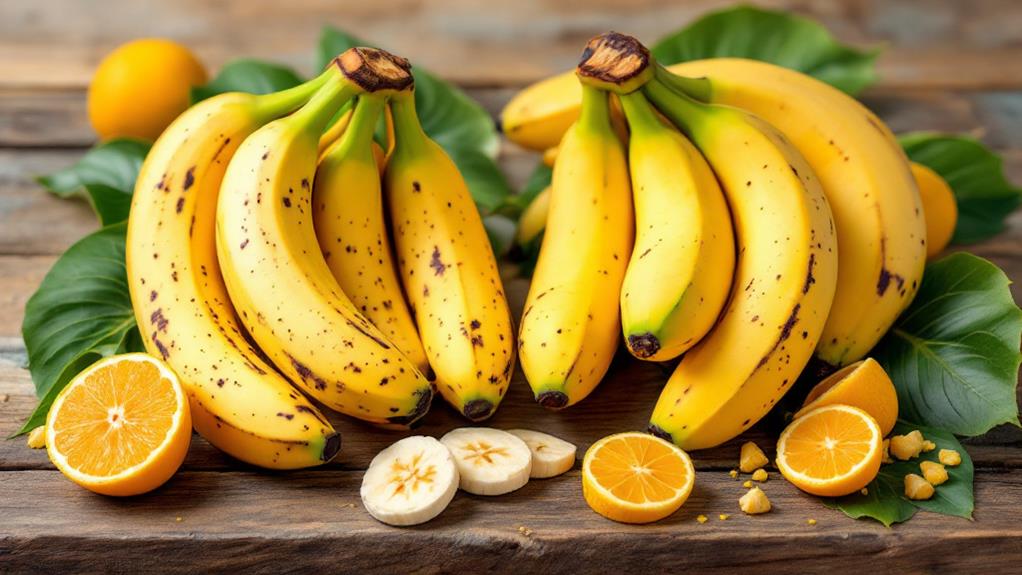
After exploring the culinary versatility of plantains, it's helpful to understand how they differ from bananas. While both fruits are nutritious, plantains are starchier and less sweet, making them ideal for cooking. Unlike bananas, which you typically enjoy fresh and raw, plantains need to be cooked. Their higher carbohydrate content means they're perfect for frying, boiling, or baking, offering a variety of health benefits.
Nutritionally, both plantains and bananas are rich in crucial vitamins and minerals. However, plantains pack more vitamin A, vitamin C, and potassium, making them nutrient-dense options. This extra potassium is beneficial for maintaining healthy blood pressure. Plantains also have a lower glycemic index than bananas, which helps if you're managing blood sugar levels.
When it comes to texture, plantains stand out. They have a firmer texture when cooked, making them versatile in a range of dishes.
- Sweet vs. Savory: Bananas are naturally sweet, while plantains shine in both sweet and savory recipes.
- Nutrient Density: Plantains offer more vitamins and minerals due to higher vitamin A and potassium content.
- Cooking Necessity: Unlike the snack-friendly banana, plantains require cooking for the best taste and texture.
Consumption Tips
When choosing plantains for your meals, focus on their ripeness to match the dish you're preparing. If you're aiming for savory dishes, opt for green plantains—they're firmer and less sweet, perfect for tostones or chips. Yellow plantains offer a sweet touch, ideal for maduros or adding to stews. For desserts, let them ripen until they're black, ensuring a rich, sweet flavor. Store them at room temperature and consume them within a week of reaching the desired ripeness for the best flavor and quality.
Incorporate plantains with fiber-rich foods like beans and vegetables to improve digestion and nutrient absorption. Just remember, plantains are high in carbohydrates, providing 58g per serving, so moderate your consumption to avoid blood sugar spikes. Investigate different cooking methods to optimize their health benefits. Boiling or baking plantains can retain their nutritional value without adding unhealthy fats, unlike frying. These methods can help maintain their natural health benefits while keeping added calories in check.
Enjoy the versatility of plantains by experimenting with these tips, ensuring you reap their nutritional rewards while adding variety to your meals.
Potential Risks
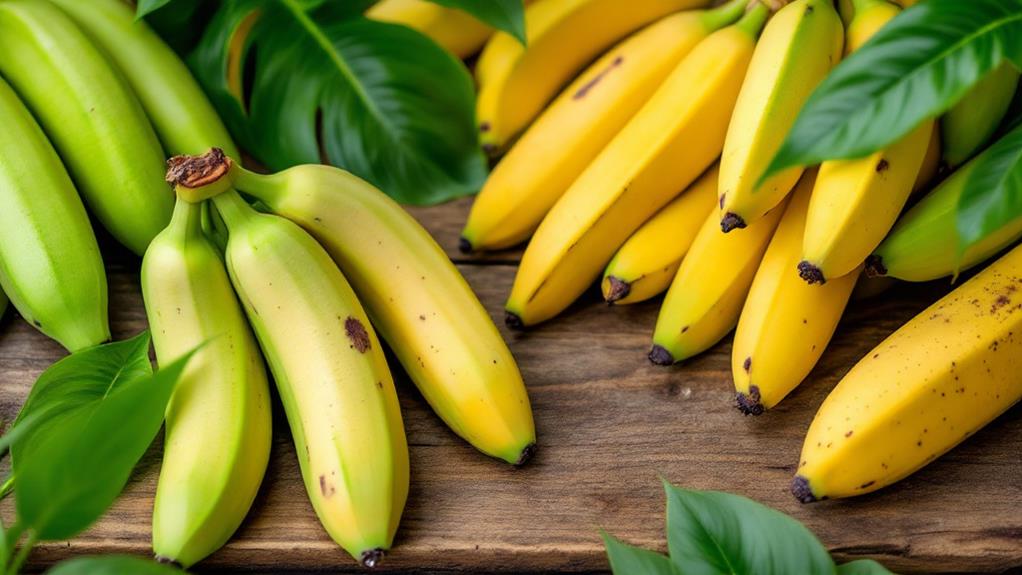
Often overlooked, the potential risks associated with consuming plantains stem from their high carbohydrate content. Overconsumption can easily lead to excessive carbohydrate intake, potentially contributing to weight gain, especially if you're not balancing it with physical activity. Those with diabetes need to be vigilant about portion sizes and the glycemic load of plantains, as these factors can greatly impact blood sugar levels.
Consider these potential issues when enjoying plantains:
- Cooking methods: Frying plantains adds unhealthy fats, which can negate their nutritional benefits.
- Ripeness: Choosing plantains at the right ripeness is essential, as unripe ones might not suit everyone's taste due to their firmer texture and lack of sweetness.
- Allergic reactions: Although rare, they're possible, especially if you're sensitive to bananas, possibly leading to swelling or hives.
Being mindful of how you prepare and consume plantains can help mitigate these risks. Opt for healthier cooking methods like boiling or baking to preserve their benefits. By managing portion sizes and understanding the ripeness, you can enjoy plantains without compromising your health or dietary goals. Remember, moderation is key to avoiding adverse effects.


